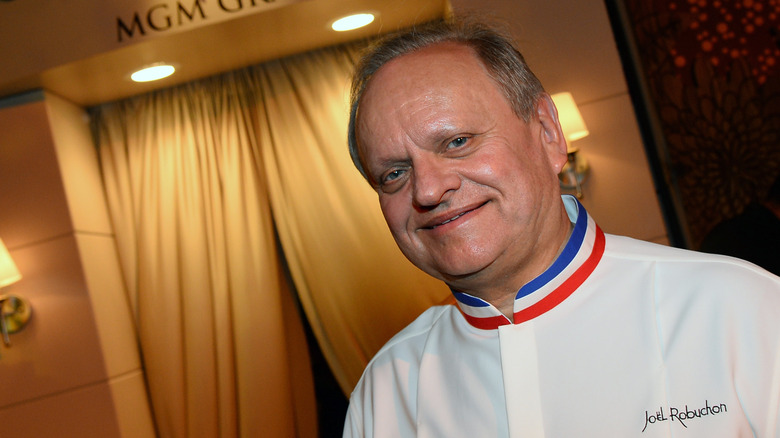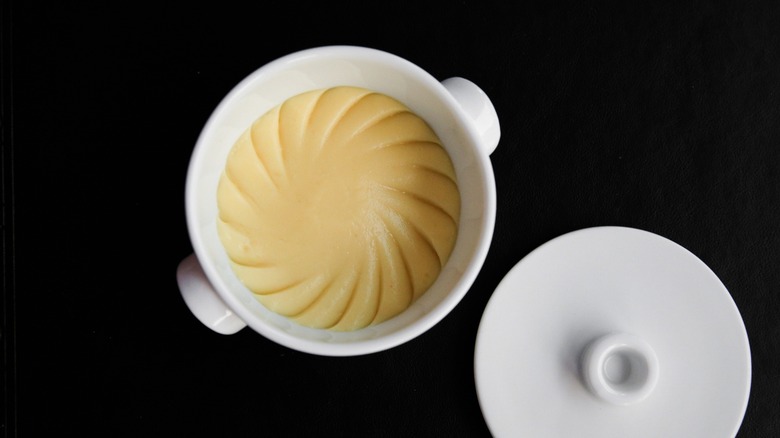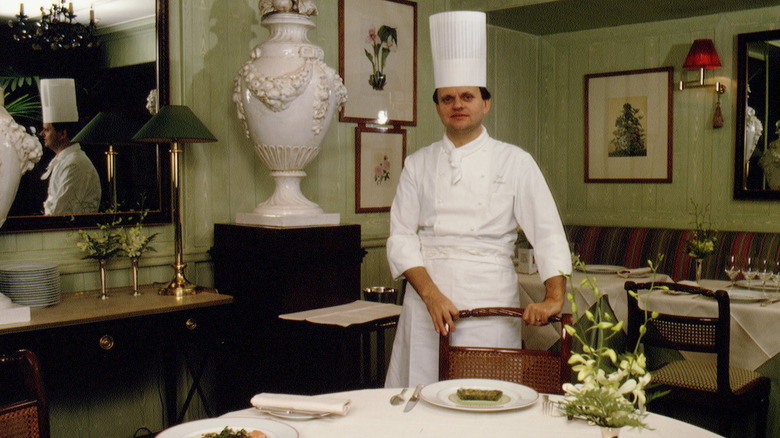The Touching Experience That Inspired Joël Robuchon's Culinary Career
"To describe Joël Robuchon as a cook is a bit like calling Pablo Picasso a painter, Luciano Pavarotti a singer, Frédéric Chopin a pianist," wrote celebrated food writer Patricia Wells in her book "L'Atélier de Joël Robuchon." Though he eventually became perhaps the most respected and influential chef of the 20th century and the most Michelin-decorated chef of all time, Robuchon's culinary origins were a far cry from the dazzling glamor of his later career.
Robuchon grew up around Poitiers in western France as one of four children. His father, Henri, was a bricklayer, and his mother, Julienne, raised the children. They were far from a family of means and were committed Catholics. It seemed that Joël was always bound to join the priesthood, and he began studying at the seminary in what is now Mauléon at age 12. But, it was here that the course of his life would be altered forever. He began to help the nuns at the seminary prepare food, his work in the kitchen becoming a source of comfort amid a turbulent family life that culminated in the collapse of his parents' marriage three years later. By that point, the money had run out, and Joël needed an escape. That time with the nuns pointed him toward cooking, and he found his first apprenticeship at the Relais de Poitiers hotel.
Robuchon's time cooking with the nuns informed his career
By the time he was in his early 20s, Robuchon had begun the Compagnon du Devoir, a training program for craftsmen that dates to the middle ages and involves traveling for several years throughout France to learn a trade. Robuchon's trade was, unsurprisingly, cookery. Though he had left behind the dream of joining the priesthood, he remained spiritual and found guidance in Paris under the auspices of the restauranteur Jean Delaveyne.
His spirituality wasn't the only thing that the nuns left him with, though. A love of and reverence for the simpler things in cooking came to embody Robuchon's approach to food. Despite the grandeur that surrounded his name (and the stars, both Hollywood and Michelin), Robuchon's great skill was taking simple dishes and elevating them to new heights. Take his most iconic dish – the iconic Robuchon pommes puree. Long held as some of the greatest mashed potatoes ever made (an honor bestowed by both Anthony Bourdain and later by Food Republic), his method of carefully drying the potatoes, folding in boiling hot milk, and incorporating enough butter that it made up 25% of the whole dish was an exercise in dedication, refinement, and simplicity in cooking. His career began with food that provided comfort and nourished the spirit and soul. His most iconic dish would eventually embody those same principles.
Religion inspired Robuchon's food and culinary philosophy
In 2018, months before he died, Robuchon spoke to Michelin Guide about his childhood. "We were Christians and a very special moment is at every dinner, mother used to take a big loaf of bread and put it on her breast and do a cross on the bread," he said "Then she would cut big slices to share with the family. It was really a matter of love and feeding your whole family. Cooking, passion and all the love was put into the cooking to share with the family." That philosophy was something he carried over into his work, emphasizing the importance of cooking with love and care.
Perhaps it was that quality that elevated him above the rest. From childhood evenings spent at his family's dining table in their small home above a cobbler in the aftermath of the Second World War to those small moments of respite he got in the kitchens of the seminary and his empire of Michelin-starred kitchens, cooking for him was synonymous with that feeling of nourishment and care. The career of the world's greatest chef is proof of that age-old adage that food is best when made with love.



